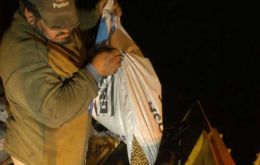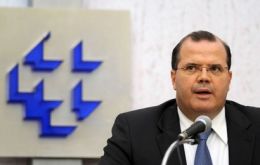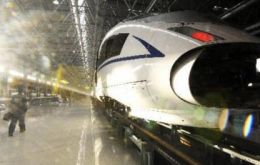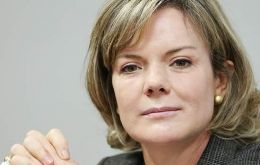MercoPress. South Atlantic News Agency
Brazil
-
Thursday, June 9th 2011 - 22:48 UTC
Brazil crop of grains and oilseeds expected to reach a record 161.5 million tons

Brazil’s 2010/2011 crop of grains and oilseeds is estimated to reach 161.5 million tons, up 8.2% (8.2 million tons) over the previous farm year (149.2 million tons), according to the latest survey from the National Supplies Corporation, Conab.
-
Thursday, June 9th 2011 - 22:41 UTC
Brazil’s world’s leading chicken exporter in 2011, ahead of the United States

Brazil is poised to overtake the United States for the first time ever, as the world’s leading exporter of chicken, with a third of global trade, according to the latest statistics from FAO released this week.
-
Thursday, June 9th 2011 - 19:24 UTC
Brazil hikes basic rate to 12.25% and further increases can be expected

Brazil's central bank increased late Wednesday its benchmark interest rate for the fourth straight meeting after consumer prices exceeded the upper limit of its target range for the first time since 2005.
-
Thursday, June 9th 2011 - 05:52 UTC
Ousted Palocci takes his job as member of Petrobras administration council

Antonio Palocci, who on Tuesday stepped down as President Dilma Rousseff’s chief of staff over questions about his personal finances, will be taking a seat at Petrobras Administration Council, confirmed Brazil’s oil giant president Sergio Gabrielli.
-
Wednesday, June 8th 2011 - 23:32 UTC
Brazil unveils plan and incentives to boost ethanol production

Brazil's government unveiled new financing and other incentives for sugar cane ethanol production, vowing to work closely with the private sector to boost production in an industry that has struggled recently despite its immense promise.
-
Wednesday, June 8th 2011 - 23:20 UTC
China completes first high-speed electric train for Rio do Janeiro

China has built the first high-speed electrical train for Brazilian capital Rio de Janeiro in time for use during the 2014 World Cup Football and 2016 Olympic Games.
-
Wednesday, June 8th 2011 - 23:16 UTC
Brazil, India, Russia increased global proven oil reserves by 0.5% in 2010 says BP

Global proven oil reserves rose by 0.5% in 2010, boosted by increases in Brazil, India and Russia, according to British Petroleum. Deposits advanced to 1.3832 trillion barrels at the end of last year from a revised 1.3766 trillion in 2009, BP said in its annual Statistical Review of World Energy.
-
Wednesday, June 8th 2011 - 23:03 UTC
Rocketing values for cattle in Brazil anticipate ‘beef prices will remain high’

World beef prices look set to stay high long term given the rocketing prices of raising cattle in Brazil, and the lack of an obvious successor as the world's low-cost producer.
-
Wednesday, June 8th 2011 - 03:14 UTC
“A Lula da Silva man steps down; a Dilma woman moves in”

Brazilian Senator Gleisi Helena Hoffmann, 45, wife of Communications Minister Paulo Bernardo has been chosen by President Dilma Rousseff to replace outcast Antonio Palocci as chief of staff.
-
Wednesday, June 8th 2011 - 02:28 UTC
Embattled Palocci, the most influential official in Brazil’s cabinet, resigns

Brazil’s embattled Chief of Staff Antonio Palocci described by fellow ministers as the most influential official in President Dilma Rousseff's government resigned on Tuesday to prevent a scandal over his finances from becoming an ongoing distraction for the administration.
